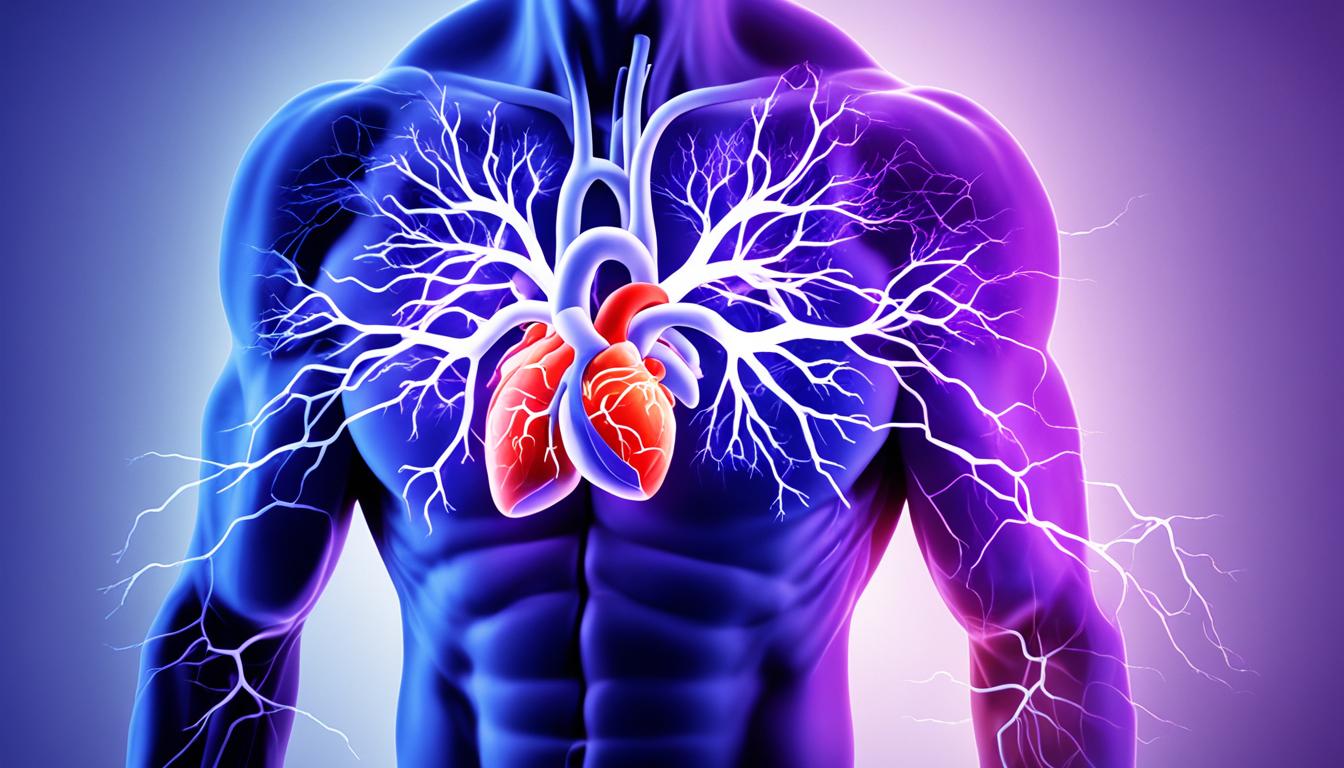Wolff-Parkinson-White (WPW) syndrome is a rare condition affecting the heart’s electrical system. It’s when there are extra paths for electrical signals. These pathways cause a problem in how signals move through the heart.
An additional electrical pathway in the heart is what causes WPW syndrome. This can result in fast heartbeats. The main signs on an ECG test are a short PR interval and a long QRS complex with a delta wave.
People with WPW may feel their heart racing, get dizzy, and sometimes faint. In severe cases, their heart may suddenly stop. Doctors diagnose WPW by looking at symptoms, ECG results, and other tests. These tests show if there are unusual pathways in the heart.
WPW syndrome can be due to genetic factors or occur by chance. It might also be linked to certain heart issues. Early detection and right treatment are very important. This can help avoid more serious problems and make the patient’s health better.
Key Takeaways:
- WPW syndrome affects the heart’s electrical system with extra paths for signals.
- It makes the heart beat too fast sometimes.
- Signs include a fast heartbeat, dizziness, fainting, and can be serious in some cases.
- Doctors use tests like ECGs to find out if someone has WPW syndrome.
- It might be caused by genes or certain heart issues, but it still happens by chance sometimes.
Treatment Options for Wolff-Parkinson-White (WPW) Syndrome
Treating Wolff-Parkinson-White (WPW) syndrome focuses on stopping fast heartbeats and avoiding risks. The main treatment is catheter ablation, a method that fixes the extra electrical pathway causing the issue.
Catheter ablation often works well. It gets rid of the extra pathway, easing symptoms for a long time. This process uses a small, flexible tube to reach the heart through a blood vessel. The path that’s causing trouble is then removed using heat, cold, or special energy.
Medications might also be given. They help slow the heart during fast beating spells. Anti-arrhythmic drugs, beta-blockers, and calcium channel blockers can help keep the heart rhythm normal and stop it from going too fast.
Sometimes, if medicines and ablation don’t help enough, implantable cardioverter-defibrillators (ICDs) are used. These devices watch over the heart’s rhythm. If they see a dangerous change, they can shock the heart back to normal.
Choosing the best treatment depends on each patient’s situation. How severe the issue is and if there are other heart problems matter a lot. It’s key to keep checking in with the doctor to make sure the treatment is working well and to catch any problems early.
| Treatment Option | Description |
|---|---|
| Catheter Ablation | A minimally invasive procedure that targets and ablates the accessory pathway responsible for the abnormal electrical conduction in the heart. |
| Medication | Anti-arrhythmic drugs, beta-blockers, and calcium channel blockers can be prescribed to help regulate the heart rhythm and control acute episodes of tachycardia. |
| Implantable Cardioverter-Defibrillators (ICDs) | If tachycardia persists or is life-threatening, implantable devices can be recommended to monitor and correct abnormal heart rhythms. |
Prognosis and Outlook for Wolff-Parkinson-White (WPW) Syndrome
The outlook for those with Wolff-Parkinson-White (WPW) syndrome is usually good. This is especially true with the right care. Most people with a WPW pattern on their ECG do not get serious problems. They go through life without any symptoms.
But, for those who get faster than normal heartbeats, quick treatment is key. Without treatment, WPW can cause very serious heart issues. These include atrial fibrillation and ventricular fibrillation, which can be deadly.
Today, ablation therapy is a great option to stop these problems from coming back. If managed well and with regular check-ups, people with WPW can have a normal life. It’s crucial they know the signs of heart rhythm issues and see a doctor if they worry about any symptoms.
The future looks brighter for those with WPW syndrome thanks to medical progress. This means opportunities for a better quality of life and outlook are increasing.

